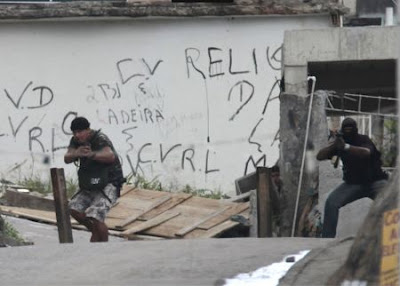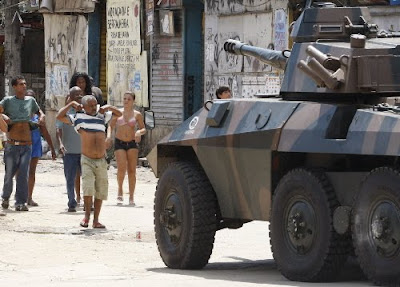










After the 'War in Rio' reached international news last week, I've received several messages concerning my safety and interest in how things are in the favela where I live, Rocinha. It has been nice to know that people have me in their thoughts, but I feel to truly understand what's going on, this war, one must understand why and how it all started.
As with any illegal drug trade. There are more actors than what meets the eye. Most of arms possessed by favela traffickers (which include sniper rifles, machine guns, AK47, M-16, grenades, rocket launchers, various explosives, etc.) come directly from the police or other 'connected' public figures. The same public figures who have continuously turned a blind eye to these expanding and densely populated communities, many of which suffer from open sewers and other elements that accompany life amidst poverty. These abandoned communities are home to such trafficking factions such as Comando Vermelho, Terçero Comando, and Amigos dos Amigos which now control most of the city's favelas.
Far from the postcard image of Rio de Janeiro, these favelas are some of the poorest and most vulnerable communities in Brazil, usually enjoying little or no provision of public services. Only now that more international attention is being brought to Rio de Janeiro is the plan of action changing from confrontational crackdowns, which don't seem to just target traffickers, but entire favela communities, to one of a seemingly more organized approach. These operations have continuously resulted unsuccessfully in ridding traffickers from the community, and one has to question: are they really intended to? What really results after an operation is a few bodies in the streets and a temporary displacement of the gang. However, with the Olympics as well as the World Cup coming to Rio in a few short years, pressure to 'clean up' the city is heavier than ever.
The program in which to accomplish this has been deemed the 'Unidades de Polícia Pacificadora' (cognates) or simply 'UPP'. The program attempts to clean the community of drug trafficking and implement militant police, who live within and take part in community activities.
Fast forward to November 22, 2010. Traffickers, provoked by the implementation of UPP programs in various favelas around the city, ventured into Rio's richer South Zone setting fire to city buses, personal vehicles, and committed a series of simultaneous robberies outside of shopping malls in a joint effort to demonstrate their power, to instill an idea that they would not be 'pacified'. These attacks continued for three days and on Wednesday, the war started. Tanks, armored vehicles, BOPE (Brazil's Elite Squad or SWAT), soldiers, and police entered Vila Cruzeiro, a Comando Vermelho stronghold (the group taking responsible for the attacks on the city) driving traffickers out. Many of them poured into a neighboring favela, Complexo Alemão, another CV stronghold. Two days later Complexo Alemão was invaded, with arrests of the favelas bosses, many were forced to surrender. The rest, many say, came here to Rocinha. The UPP program has started in both favelas.
With rumors of drug factions joining together in an effort to combat the police forces, Rocinha, my home for the last five months, has become tense. No one really knows exactly when it will happen, but one thing is for sure, Rocinha is next. My heart aches, it aches because I have the option to leave and my friends and neighbors don't. It aches because this UPP program is a band aid on a much larger issue. Traffickers exist within favelas because these communities have long been ignored by the city and federal governments. Absent are efforts for basic sanitation, health care, education, improved construction, transportation, and the list goes on. The absence of such basic provisions have bequeathed a band of criminals who are often the most disadvantaged in the community. Another important piece of information is that these traffickers do not act alone. Marijuana, cocaine, assault rifles, grenades, none of that crap is made here in the favela. It's transported here, and by the time it arrives it's passed through the dirty hands of private and public criminals. I'm not arguing in favor of criminal factions in the favela, but what I am arguing is that such a whimsical approach to 'pacifying' the favela will never work. It's timing and approach prove that once again, this city could care less about favelas and their residents.
2 comments:
Gary,
I'm so sorry, I know your heart is in pain.
Please email when you can, I have lost your email address again!
Love and miss you so very much,
Auntie
Gary,
I've been thinking about you a lot. Hope you and all your friends are okay! Praying for you. Lets talk when you can. Love you
Danielle
Post a Comment